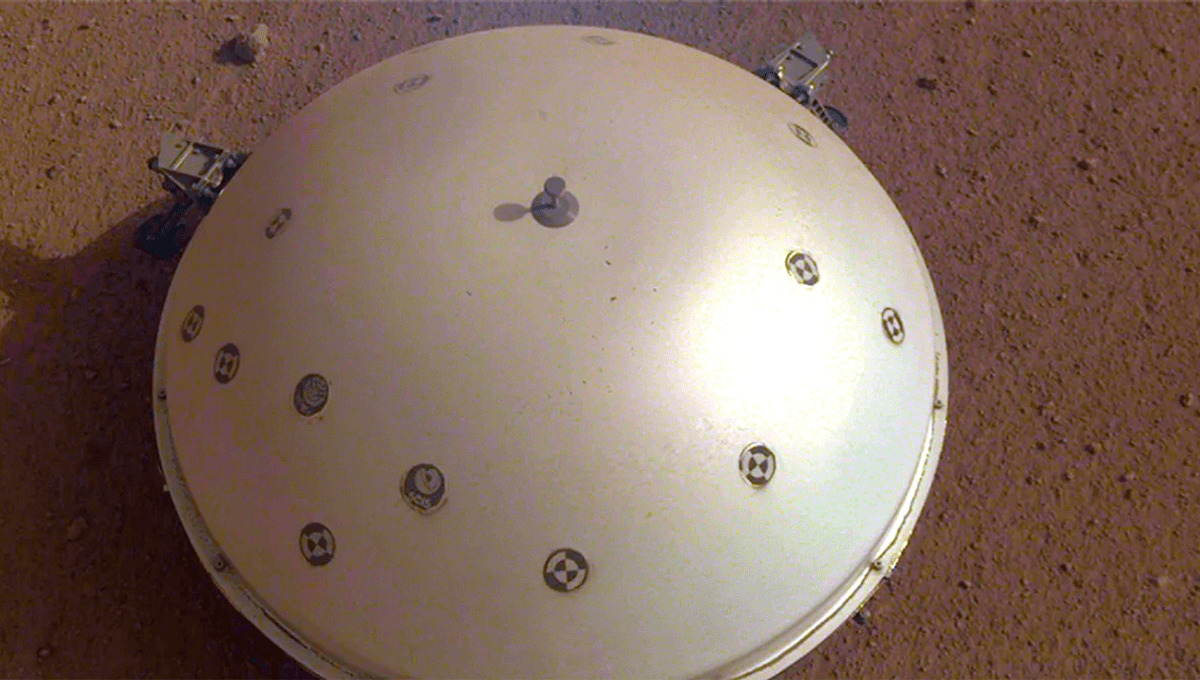
A new preprint study looking at data from NASA’s Interior Exploration using Seismic Investigations, Geodesy and Heat Transport (InSight) Lander has claimed to find evidence that Mars has a solid inner core, just like the Earth.
By looking at the seismic vibrations from beneath the surface, scientists can put together a picture of the composition of the material below as the vibrations pass through it. This is why NASA launched InSight in 2018, to become the first mission to take an in-depth look at Mars’s interior as waves from marsquakes travel through the planet.
As well as discovering other cool things like how many meteorites hit Mars every year, the lander’s data can be used to tell us more about the planet’s crust, mantle, and core.
Previous studies looking at InSight data have pointed to Mars having a liquid core, and there are other reasons to suspect that the core is, at least mostly, liquid.
“Despite its strongly magnetized ancient crust, Mars’ current lack of a global dynamo field implies the cessation of a past dynamo, potentially indicating an absence of chemical convection associated with inner core growth,” the authors of the new paper explain. “Additionally, cosmochemistry data suggests that the core is liquid, given its high content of light elements.”
However, the team from the University of Science and Technology of China and the University of Texas at Austin believe they have found preliminary evidence of a solid inner core within Mars, by utilizing a “substantial number” of low-frequency marsquakes as a source array for array analysis.
“By implementing array analysis on the waveform data […] we can generate vespagrams, where a robust energy peak at a certain time represents coherent seismic phases with the characterized horizontal slowness (reciprocal of the ray parameter),” the team explains. “Thus, different phases with different ray parameters can be effectively isolated.”
Analyzing the data for the study, which has not yet been peer reviewed, they believe that the wave arrival times suggested a solid inner core, through which the waves can travel more quickly. What’s more, they believe that the core is around 18 percent of Mars’s radius, pretty similar in size to Earth’s inner core, which is around 19 percent of Earth’s radius.
While the proportions are roughly the same, the team believes the mechanism of formation may be different to the formation of Earth’s inner core.
“In the first scenario, with a lower Martian geotherm, a solid Fe-rich phase can crystallize from the top and form a snow formation zone. These dense solid droplets descend towards the center and develop an inner Fe-Ni core, which leaves behind a S-enriched liquid OC [outer core],” the team explains in their discussion.
“Alternatively, if we consider a core with a higher sulfur content such as ~16 percent, the melting curve could exceed the eutectic temperature, intercepting the geotherm with a steeper slope. In such a case, the core would solidify from the bottom-up.”
While an interesting study, it is out of line with other studies which show Mars’s core to be liquid. Further analysis, and likely data, is needed before we can conclude that Mars’s inner core is solid after all. Were it to be the case, it may raise further questions, for example why Mars seems to lack a global magnetic field, which we know on Earth is driven by dynamics at the core.
The preprint paper is under review at Nature, and is posted to Research Square.
Source Link: NASA Marsquake Data May Show Mars Has A Solid Inner Core, Like Earth